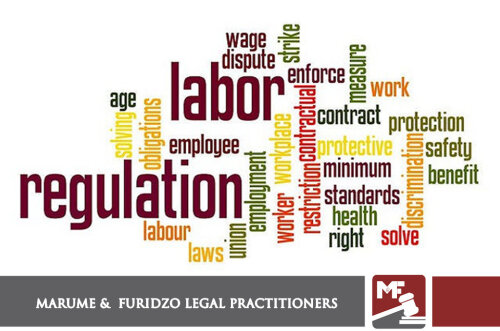Best Hiring & Firing Lawyers in Harare
Share your needs with us, get contacted by law firms.
Free. Takes 2 min.
List of the best lawyers in Harare, Zimbabwe
About Hiring & Firing Law in Harare, Zimbabwe
In Harare, Zimbabwe, employment relations, including hiring and firing, are primarily governed by the Labour Act. The law is designed to ensure fair treatment of workers and to create a framework that facilitates equitable employment practices. Employers must follow specific procedures when hiring or terminating employees, making sure that the rights of all parties are respected. This ensures that actions are conducted in good faith and with transparency. Moreover, employment disputes are comparatively frequent, necessitating a sound understanding of the legal framework to avoid and resolve possible conflicts.
Why You May Need a Lawyer
Legal advice may be needed in situations such as drafting employment contracts, understanding employee rights, navigating wrongful dismissal claims, or dealing with workplace disputes. Employers might seek legal counsel to ensure compliance with labour laws and to mitigate risks associated with hiring, disciplinary actions, or terminating employees. Employees may require legal assistance if they encounter unfair dismissal, discrimination, or if they need help understanding their rights and obligations under their employment contract. Additionally, both parties can benefit from lawyers when negotiating settlements or labor agreements.
Local Laws Overview
The Labour Act [Chapter 28:01] is the key legislative framework governing employment in Zimbabwe, including Harare. It enshrines rights and protections for both employers and employees, covering areas such as non-discrimination, wages, leave entitlements, and collective bargaining. Key aspects include:
- Contracts of Employment: All employment terms must be documented in a written contract.
- Terminations: Procedural and substantive fairness must be followed. Notice periods and severance payments are regulated.
- Dismissal: There are specific grounds on which dismissal is considered fair, including misconduct and incapacity.
- Workers' Rights: Protection against unfair labour practices and discrimination.
- Dispute Resolution: Labour disputes are usually resolved through the Labour Court or by arbitration.
Frequently Asked Questions
What are the legal requirements for terminating an employee?
Termination must be both procedurally and substantively fair. Employers must provide notice, valid reasons, and follow due process as specified in the Labour Act.
Can an employer terminate an employee without notice?
No, unless the termination is due to justified reasons like serious misconduct, where summary dismissal may be permissible.
How are disputes between employer and employee resolved?
Disputes can be resolved through internal grievance procedures, mediation, arbitration, or by approaching the Labour Court.
What constitutes unfair dismissal?
Dismissal without a fair reason or without following due process is considered unfair. Reasons, such as discrimination or retaliation, are typically unlawful.
Are there any restrictions on hiring practices?
Yes, hiring practices must be non-discriminatory and should comply with the Labour Act. Employers should equally consider all qualified candidates regardless of race, gender, or other discriminatory factors.
What are the obligations of employers regarding employment contracts?
Employers are required to provide written contracts that outline terms of employment, including job duties, salary, and conditions of service.
Is it necessary to provide severance pay upon termination?
Yes, severance pay is required, with calculations usually based on the employee's tenure and last earned salary, unless termination is due to misconduct.
Can an employee be dismissed for performance issues?
Yes, but only after the employer has followed a fair performance management process and given the employee an opportunity to improve.
What leaves are employees entitled to?
Employees are entitled to various types of leave, including annual leave, sick leave, maternity leave, and special leave as per the Labour Act.
How can one report unfair dismissal or discrimination?
Employees can file a complaint with the Labour Court or seek redress through arbitration or mediation services provided by Qualified Labour Officers.
Additional Resources
To further explore hiring and firing laws, one could reach out to the Ministry of Labour and Social Welfare for guidance. The Zimbabwe Congress of Trade Unions (ZCTU) also provides advice and support for workers. For specific legal advice, local law firms specializing in employment law can offer tailored guidance.
Next Steps
If legal assistance is necessary, start by documenting all relevant employment details and potential issues. Consider consulting with a labour lawyer in Harare to discuss your situation and explore the available legal avenues. Check local law societies or legal aid organizations for lawyer referrals or pro bono services if required. Understanding your rights and the obligations of employers is crucial, and professional legal advice can ensure fair treatment and resolution.
Lawzana helps you find the best lawyers and law firms in Harare through a curated and pre-screened list of qualified legal professionals. Our platform offers rankings and detailed profiles of attorneys and law firms, allowing you to compare based on practice areas, including Hiring & Firing, experience, and client feedback.
Each profile includes a description of the firm's areas of practice, client reviews, team members and partners, year of establishment, spoken languages, office locations, contact information, social media presence, and any published articles or resources. Most firms on our platform speak English and are experienced in both local and international legal matters.
Get a quote from top-rated law firms in Harare, Zimbabwe — quickly, securely, and without unnecessary hassle.
Disclaimer:
The information provided on this page is for general informational purposes only and does not constitute legal advice. While we strive to ensure the accuracy and relevance of the content, legal information may change over time, and interpretations of the law can vary. You should always consult with a qualified legal professional for advice specific to your situation.
We disclaim all liability for actions taken or not taken based on the content of this page. If you believe any information is incorrect or outdated, please contact us, and we will review and update it where appropriate.















